US May Keep American Troops in Iraq, Despite Lack of Authority
Some of the hundreds of US troops still in Baghdad have been training and supporting Maliki's abusive elite security forces
by John Glaser, October 01, 2012
The US is keeping hundreds of American troops and security personnel in Iraq,despite a recently-passed resolution from Congress that failed to reauthorize funding for the US military to train and support Iraqi security forces.
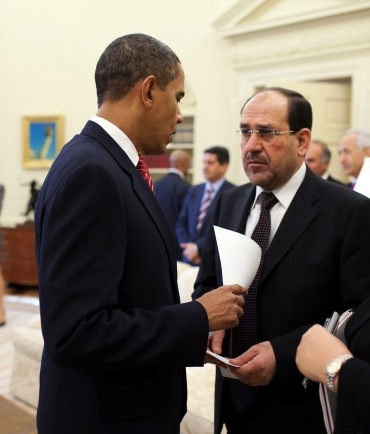 Most Americans have been led to believe that all US forces besides those guarding the massive American Embassy in Iraq have been withdrawn since the end of last year. But small units of up to 300 troops have remained in Baghdad to train Iraqi security forces and provide aid and support, allegedly for counter-terrorism operations.
Most Americans have been led to believe that all US forces besides those guarding the massive American Embassy in Iraq have been withdrawn since the end of last year. But small units of up to 300 troops have remained in Baghdad to train Iraqi security forces and provide aid and support, allegedly for counter-terrorism operations.
In reality, US troops have been providing this support to elite Iraqi forces that report directly to the increasingly authoritarian Prime Minister Nouri al-Maliki. They have essentially been used as a secret police force for Maliki to attack, detain, and torture his political opponents and crack down harshly on public dissent.
There were attempts in the Washington pipe-line to negotiate with Iraq an agreement in which even more US troops would be sent back. But last month, Congress passed a resolution that did not reauthorize funding for these small units. “The authority for U.S. forces to train and assist the Iraqi security forces expired Sunday [Sept. 30],”reports The Cable‘s Josh Rogin.
Still, the Pentagon is scrambling to try and keep the forces there.
“No personnel will return immediately to the United States on Oct. 1, 2012 while DoD is reviewing the effect of not being authorized under the Continuing Resolution to continue the training of Iraqi Security Forces (ISF) following expiration of the Iraqi Security Forces Fund (ISFF) authority on Sept. 30, 2012,” Pentagon spokesman Lt. Col. Wesley Miller told The Cable. “The Department of Defense is reviewing the availability of other authorities that may authorize OSC-I to conduct training activities in Iraq.”
Despite claims by the Obama administration about “ending the Iraq war” and bringing our troops home, the US is still very much involved in Iraq, in training the abusive security forces, in propping up the corrupt and dictatorial Maliki government, and in trying to slowly slip more US forces into the country.
and from Disasterstan....
NATO Withdrawal From Afghanistan ‘Could Accelerate’ Amid Blatant Failures
NATO Secretary General Anders Fogh Rasmussen said troops could be withdrawn earlier than expected
by John Glaser, October 01, 2012
Some US and allied forces in Afghanistan could possibly withdraw sooner than the expected date of the end of 2014, according to NATO Secretary General Anders Fogh Rasmussen.
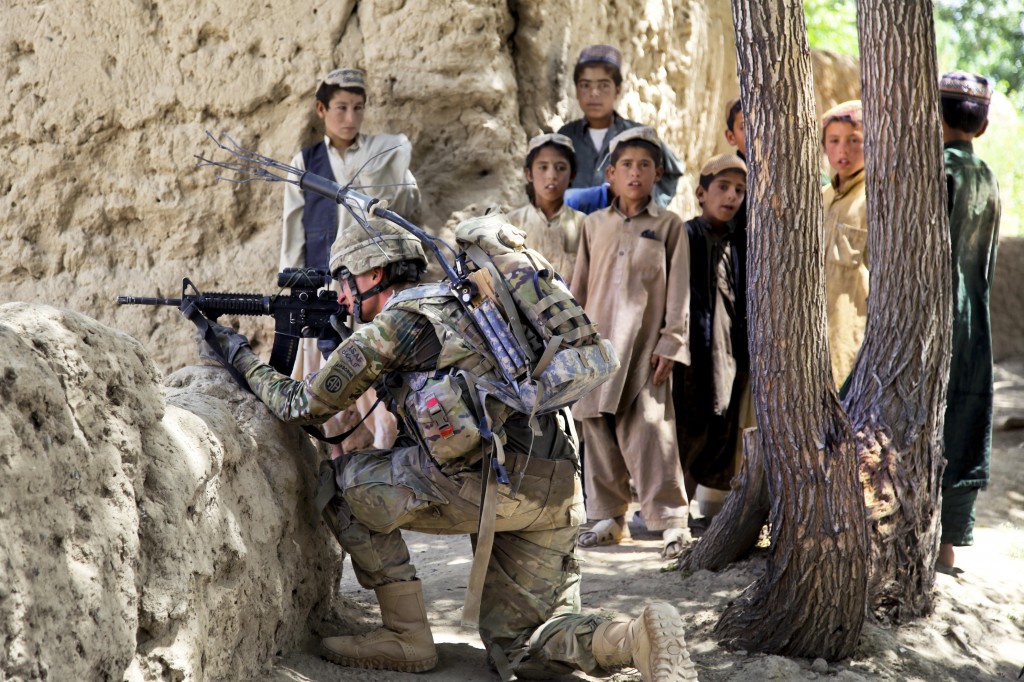 “From now until the end of 2014 we will see announcements of redeployments, withdrawals or drawdown,” Rasmussen told the Guardian in an interview. “If the security situation allows, I would not exclude the possibility that in certain areas you could accelerate the process.”
“From now until the end of 2014 we will see announcements of redeployments, withdrawals or drawdown,” Rasmussen told the Guardian in an interview. “If the security situation allows, I would not exclude the possibility that in certain areas you could accelerate the process.”
He went on to say that options for early withdrawal were being discussed and should be clear one way or the other within three months.
The NATO official’s comments come at a time when virtually the entire US political establishment recognizes that the war in Afghanistan is a complete and total failure. Both the Obama administration and the Romney campaign agree that US troops should be withdrawn in 2014.
A military report of the mission in Afghanistan released last month documented the continued resilience of the insurgency in number of attacks on US and NATO troops. The Taliban are as strong as ever, the regime in Kabul is weak and cannot provide security, and overall violence has not subsided.
Rasmussen also noted the effectiveness of the newest Taliban strategy of infiltrating US-trained Afghan security forces, and repeatedly attacking occupation forces. The number of so-called “insider attacks” has risen considerably over the past few months, with more than 50 NATO troops having died so far this year.
“There’s no doubt insider attacks have undermined trust and confidence, absolutely,” he said. The top US general in Afghanistan, General John Allen, told CBS’s 60 Minutes this week he was “mad as hell” about the tactic, and about the sanctuary that such insurgent elements are provided over the border in Pakistan.
But the Afghan security forces turning their guns on their US counterparts are not all Taliban. Many of them are ordinary Afghans pissed off about the ongoing occupation of their country and aggrieved at the foreign soldiers helping to tear apart Afghanistan for the past decade.
and.....
US Initially Refuses to Admit Newest ‘Insider Attack’ in Afghanistan
A new insider attack that killed 2 Americans came only 2 days after the US resumed operations with Afghan forces
by John Glaser, October 01, 2012
An insider attack has killed two Americans in Afghanistan a mere two days after the US resumed operations with Afghan security forces that were suspended in response to such attacks.
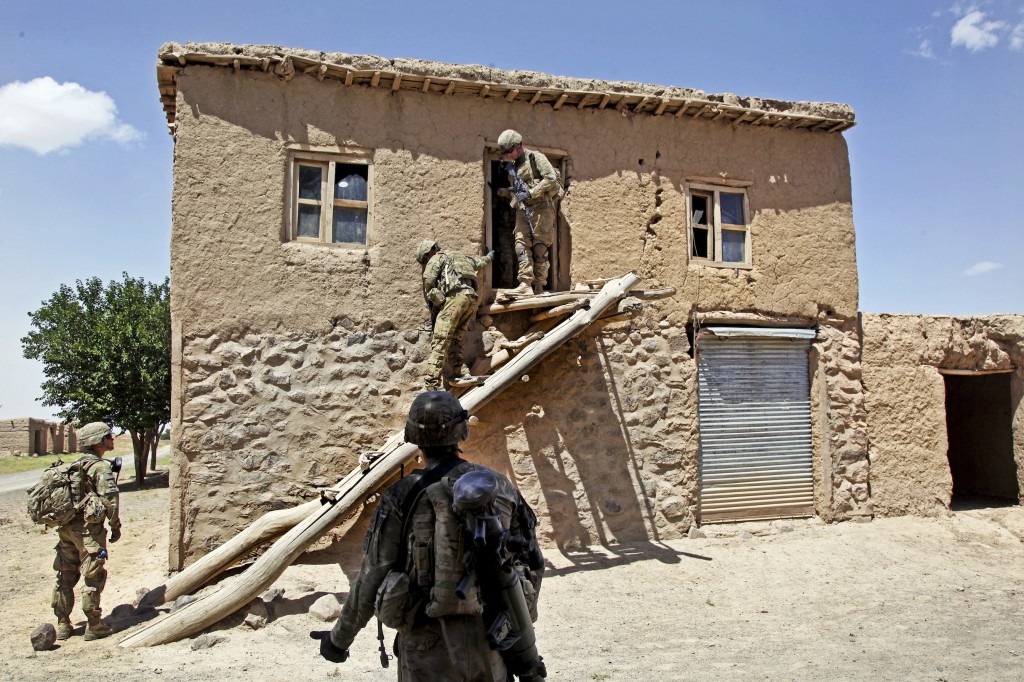 US and NATO officials initially refused to label the incident an “insider attack,” in which Afghan forces turn turn their guns on their NATO trainers and counterparts, in an apparent effort to obscure the immediate return of such attacks following a suspension in which the US was supposed to have addressed the problems.
US and NATO officials initially refused to label the incident an “insider attack,” in which Afghan forces turn turn their guns on their NATO trainers and counterparts, in an apparent effort to obscure the immediate return of such attacks following a suspension in which the US was supposed to have addressed the problems.
The attack took place after US soldiers had a cordial chat and then tea with their Afghan counterparts. One Afghan soldier then opened fire and killed one American soldier, and then a number of the other Afghan soldiers in the area, from all directions, began shooting at the Americans.
“A top Afghan military official denied that what took place was an insider attack and said the shooting was caused by a misunderstanding,” reports the Washington Post. “A preliminary military report, however, has concluded that the gunfight began only after an Afghan soldier opened fire on US troops, according to the American official, who spoke on the condition of anonymity.”
“What sets this apart is that there were multiple attackers from multiple positions and there was zero provocation,” said the official. “Typically we are talking about a single gunman who acted in a somewhat rouge fashion, but in this case we are talking about an entire Afghan army unit and a large loss of life on both sides.”
At least 51 NATO troops have been killed this year in these “insider attacks,” as vast majorities of the American public and the Washington establishment begin to acknowledge the failure of the war.
and in Libya......
US Withdraws All Personnel From Benghazi
No US Government Employees Remain in City
by Jason Ditz, October 01, 2012
Three weeks after the attack on the US Consulate in Benghazi left the ambassador and three others dead, the State Department says today that it has pulled every singlegovernment employee out of the city.
 State Dept. spokeswoman Victoria Nuland said that as far as she knows there is not a single US government employee left in the city, and that all diplomatic contacts with the powerful Libyan city are being done “remotely.”
State Dept. spokeswoman Victoria Nuland said that as far as she knows there is not a single US government employee left in the city, and that all diplomatic contacts with the powerful Libyan city are being done “remotely.”
Exactly how many people were effected by this order to vacate the city is unclear, but it means that the US still hasn’t managed to get a single investigator into the city to check on the burned-down consulate.
How much they’ll be able to learn at this point is unclear, as the consulate has sat unguarded for weeks now, and the compound of Ansar al-Sharia, the group supposedly to blame, has also been looted and burned by pro-government protesters.
and.....
US Claims Link Between Benghazi Attack and Mali ‘Powder Keg’
Sees Result of Last Year's Intervention as Excuse for More Interventions
by Jason Ditz, October 01, 2012
Struggling to come to grips with the notion of cause and effect, Secretary of State Hillary Clinton claimed in a recent speech that she believes the recent attack on the US Consulate in Benghazi was the result of the “powder keg” of terrorist activity in Mali.
 There is no indication from any of the reports that the attack had anything to do with any Malian faction, and was blamed on a local militant faction called Ansar al-Sharia Benghazi (ASB).
There is no indication from any of the reports that the attack had anything to do with any Malian faction, and was blamed on a local militant faction called Ansar al-Sharia Benghazi (ASB).
Indeed, lost in all of this is that the Mali situation, with the northern half of Azawad now under the control of Ansar Dine, is itself a direct result of the 2011 US attack on Libya in the first place. The US attacks left massive weapons caches in Tripoli unguarded,looted by Tuareg mercenaries fightingin Libya. The Tuaregs returned to Mali to launch a secessionist war in Azawad, which eventually left Ansar Dine in charge.
Instead of correctly seeing Mali as a consequence of their ill-conceived intervention in Libya, the Obama Administration is trying to spin the effect as the cause, and use it as an excuse for military intervention in Mali.
and from the Libya Herald.....
Jibril to support Government: Official
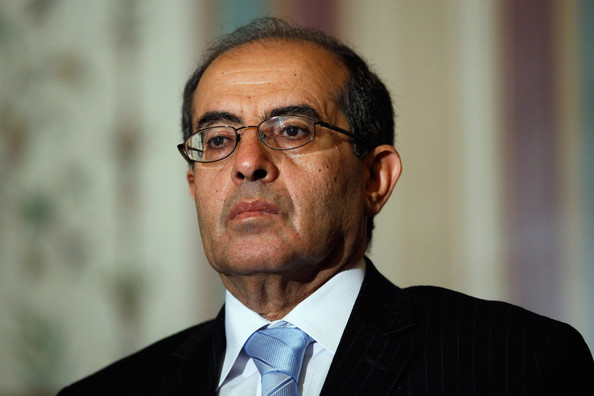
Negotiations between Jibril and Abushagur had been deadlocked for several days prior to the announcement.
Tripoli, 2 October:
Mahmoud Jibril has agreed to support the new government of Prime Minister-elect Mustafa Abushagur.
The announcement was made this morning on Abushagur’s official Twitter feed.
“I met with Dr Mahmoud Jibril yesterday and he agreed to the alliance’s participation in government. I will wait to the end of the day for receipt of his nominations”, the statement read.
A press conference has been planned for 2pm this afternoon at the Prime Minister’s office, and it is expected that further details of the development will be revealed then.
Yesterday, Abushagur’s office sent a press release stating that a planned meeting with Jibril did not take place. Neither the reason nor which party was responsible for the cancellation was provided.
The two men are known to have been in strong disagreement over several important policy areas. Yesterday, the Libya Herald reported that a major split had occurred within the NFA following the deadlock between Abushagur and Jibril, with several alliance members agreeing to submit candidates for the government independently of Jibril.
It is likely that this rupture played a part in influencing subsequent developments.
and...
http://www.libyaherald.com/?p=15478
Abushagur delays government formation as impasse with Jibril continues
Tripoli, 1 October:
Prime Minister-elect Mustafa Abushagur has failed, for the second time, to meet a self-imposed deadline to form a new government.
On 19 September, Abushagur announced that he would finalise his proposed government for submission to the National Congress by the end of the month.
Having subsequently requested an extension, the Prime Minister-elect was given until 7 October by the Congress or face being dismissed from his post.
Two days ago, a senior member of Abushagur’s staff stated that 1 October would be the latest that a government would be formed, although this deadline too has now been missed.
The latest delay appears to be down to deadlocked negotiations with National Forces Alliance leader Mahmoud Jibril.
Yesterday, the Libya Herald reported that the Abushagur team had failed to convince the NFA leader to throw his weight behind the new government, with divisions over a series of policy areas including reconciliation with former regime loyalists and the disbanding of militias.
Today, a press statement from Abushagur’s office reveals that a planned meeting with Jibril to resolve the impasse had not taken place.
“Whilst we confirm our desire and committment to include all the political sepectrum of the GNC in the formation of the next government, we regret the fact that a meeting with the leader of the NFA Mahmoud Jibril did not take place as was planned”, the statement read.
It is not known which side was responsible for the cancellation, or what the reasons behind it were.
However, it has also been claimed that several NFA members have decided to split with Jibril and to put forward candidates for the next government independently.
It is now unclear when the new government will be proposed, although it is believed that the 7 October deadline remains realistic.
and the Syria mess gets messier.....
As Syrian Civil War Escalates, Rebels Remain Deeply Divided
Getting Rebels to Talk to Each Other a Task in Itself
by Jason Ditz, October 01, 2012
The UN Special Envoy for Syria Lakhdar Brahimi’s goal of a ceasefire and negotiations rests on the assumption that the rebels and regime can be brought together at a negotiating table, something that seems a herculean task.
But even getting the rebels to talk to the other rebels is a challenge.
 That’s because over a year into the Syrian Civil War, with fighting escalating all the time, the rebel factions all remain deeply divided from one another, with the Islamist factions having no use for the military defectors, and vice versa.
That’s because over a year into the Syrian Civil War, with fighting escalating all the time, the rebel factions all remain deeply divided from one another, with the Islamist factions having no use for the military defectors, and vice versa.
Western nations promising weapons to the rebels have struggled to cope with the myriad of different groups, each of which believes itself to be the “real” leadership of the rebel movement. They have been withholding aid in an attempt to convince the various groups to come together and figure something out.
But can they come together into a rebel coalition? In many ways the rebel factions have less common ground with each other than with the Assad government, and it is hard to envision the military defectors from the Free Syrian Army (FSA) joining together with the al-Qaeda linked rebel factions reliant on foreign fighters, which have an eye on turning Syria into a theocracy.
and....
U.S. wants to repeal Iraqi chemical weapons scenario in Syria: Muallem
Monday, 01 October 2012

The U.S. wants to oust the Damascus regime by raising fears overs its chemical weapons stockpiles, creating a scenario similar to that which led to the invasion of Iraq, Syrian Foreign Minister Walid Muallem said in an interview broadcast Monday.“This issue (chemical weapons) is an invention of the American administration,” Muallem told Beirut-based al-Mayadeen TV in excerpts of an interview to be broadcast in full later Monday.
But Muallem remained vague on whether President Bashar al-Assad’s regime possesses chemical weapons, despite Damascus acknowledging in July that it has such stockpiles.
“These chemical weapons in Syria, if they exist -- and I emphasizse if -- how is it possible that we would use them against our own people? It's a joke,” he said in the interview excerpts of which were broadcast by the staunchly anti-American and anti-Israeli channel.
“But this definitely does not mean that Syria has a stockpile of chemical weapons or that it intends to use these weapons against its own people ... it is a myth they invented to launch a campaign against Syria like they did in Iraq,” he said in the interview given on the sidelines of the U.N. General Assembly meeting in New York.
A U.S.-led coalition had invaded Iraq in March 2003, accusing Saddam Hussein of possessing weapons of mass destruction. No such weapons were ever found.
Damascus acknowledged for the first time in late July that it possessed chemical weapons. It threatened to use them if attacked by outside countries, but never against its own people.
The admission raised deep concerns among the international community, with the United States saying Damascus would be making a “tragic mistake” if it decided to deploy its chemical weapons arsenal.
Rebel fighters waging an armed insurrection against Assad’s regime claimed in July that the Syrian government had moved some of these weapons to the country's borders.
U.S. Defense Secretary Leon Panetta said on Friday that the Syrian regime had moved some chemical weapons to safeguard the material as it wages war against the rebels. He said the main storage sites for its arsenal remain secure.
According to experts, these stocks, which amount to hundreds of tons, date back to the 1970s and are the largest in the Middle East.Muallem also said that “the United States is now beginning to taste the poison of terrorism that it has supported,” in reference to the Sept. 11 assault on the U.S. consulate in Benghazi that led to the death of the American ambassador to Libya.
“But this definitely does not mean that Syria has a stockpile of chemical weapons or that it intends to use these weapons against its own people ... it is a myth they invented to launch a campaign against Syria like they did in Iraq,” he said in the interview given on the sidelines of the U.N. General Assembly meeting in New York.
A U.S.-led coalition had invaded Iraq in March 2003, accusing Saddam Hussein of possessing weapons of mass destruction. No such weapons were ever found.
Damascus acknowledged for the first time in late July that it possessed chemical weapons. It threatened to use them if attacked by outside countries, but never against its own people.
The admission raised deep concerns among the international community, with the United States saying Damascus would be making a “tragic mistake” if it decided to deploy its chemical weapons arsenal.
Rebel fighters waging an armed insurrection against Assad’s regime claimed in July that the Syrian government had moved some of these weapons to the country's borders.
U.S. Defense Secretary Leon Panetta said on Friday that the Syrian regime had moved some chemical weapons to safeguard the material as it wages war against the rebels. He said the main storage sites for its arsenal remain secure.
According to experts, these stocks, which amount to hundreds of tons, date back to the 1970s and are the largest in the Middle East.Muallem also said that “the United States is now beginning to taste the poison of terrorism that it has supported,” in reference to the Sept. 11 assault on the U.S. consulate in Benghazi that led to the death of the American ambassador to Libya.
“It seems that they (the Americans) have not learned their lesson in Afghanistan,” added the foreign minister, in reference to the losses inflicted on NATO by the Taliban.
The minister reiterated that the “key to success” for the mission of international peace envoy Lakhdar Brahimi is for countries which “harbor, arm and finance armed terrorist groups” to cease their activities.
“Qatar is spending billions of dollars in Syria to kill the Syrian people, to destroy the infrastructure ... and to murder doctors and engineers,” he said.
Damascus accuses Qatar, Saudi Arabia and Turkey of supporting the armed rebellion.
“Turkey is the source of most acts of violence in Syria,” Muallem said, warning that “terrorism will turn against those who export it.”
The minister, without elaborating, did not rule out a “general amnesty decree” aimed at “national reconciliation.”
He also noted that Syria has a “strategic stock of wheat, food and medical supplies, which can last for several months.”
The Food and Agriculture Organization (FAO) says that three million Syrians are in urgent need of food and aid for grain crops and livestock.
and....
http://www.aljazeera.com/news/middleeast/2012/10/2012101163758660881.html
| Syria says US and allies support terrorism | ||||
Foreign minister Walid al-Moualem tells UN General Assembly Washington and allies are arming and financing rebels.
Last Modified: 02 Oct 2012 06:07
| ||||
| Syria's foreign minister Walid al-Moualem has accused the United States and its allies of supporting terrorism in his country but said his government remains open to a political settlement of its civil war. Moualem told the UN General Assembly on Monday that his country has been facing "organised terrorism" for over a year, a reference to the countries that are backing the armed opposition in its fight against the government. "In what context can we classify the explicit request of the United States from the armed terrorist groups not to surrender their arms as a response to amnesty decrees and decisions issued by the Syrian leadership?" Moualem asked.
"We also wonder to what extent the statements of Qatar, Saudi Arabia, Turkey, the United States, and France that clearly induce and support terrorism in Syria with money, weapons and foreign fighters, are in line with the international responsibilities of these countries in combating terrorism."
The US and France have called for regime change in Syria while Qatar, Saudi Arabia and Turkey are widely believed to be arming rebels fighting President Bashar al-Assad's regime. Qatar's emir Sheikh Hamad bin Khalifa al-Thani told the assembly last week that Arab countries should intervenein Syria out of "national, humanitarian, political and military duties" in the face of the UN Security Council's failure to act. Fighting in the country has left up to 30,000 people dead, according to estimates by activists. 'Blatant interference' Moualem said terrorism had affected "citizens, our human and scientific resources, national establishments, and also much of Syria's historic and archeological landmarks". "The latest example of this terrorist bombing took place recently in Damascus on September 26. A terrorist group with the name 'Jabhat AI-Nosrah', one of the al-Qaeda arms, took the responsibility for this attack," he added. Saleh Mubarak, of the opposition Syrian National Council in Turkey, said the minister used terrorism because it is a "sensitive" term in the West.
Moualem said that peace requires action not only by Syria but by Turkey, Saudi Arabia, Qatar, Libya and others to stop arming and financing the opposition. He also said that calls for Assad to step down were "blatant interference" in Syrian domestic affairs.
Moualem called for political solution and Syrian-led dialogue to agree on roadmap to a more democratic country and invited the opposition to "work together to stop the shedding of Syrian blood".
"We still believe in a political solution as an essential way out of the crisis," he said. For this to happen, he said, UN members should press for an end to the "arming, financing, harboring and training of terrorist groups". Washington and many of its allies accuse Syria's government of mass human rights abuses in the ongoing struggle to put down the armed rebellion. Al Jazeera's Kristen Saloomy, reporting from New York, said one Security Council diplomat described the speech as "orthodox, predictable and completely out of touch with reality". "This diplomat went on to question how the Syrian government could blame others for the refugee crisis engulfing his country when, in fact, it is the Syrian military that's arbitrarily shelling and bombing civilian areas. But, of course, the reaction to the speech depends on who you speak with," said our correspondent. Suburbs targeted Moualem's speech came as government forces shelled the eastern suburbs of Damascus and clashed with armed rebels there, activists and residents said. Residents reported hearing heavy gunfire from about 6:00am local time (03:00 GMT). They said the capital was shaken by several loud blasts, possibly artillery fire, two hours later. "Every one of them feels like an earthquake," a resident in the central district of Adawi told the Reuters news agency, in a telephone call punctuated by two loud explosions.
It said Monday's army offensive came after Assad's forces suffered heavy losses in the area on Sunday, when several military checkpoints came under attack.
|
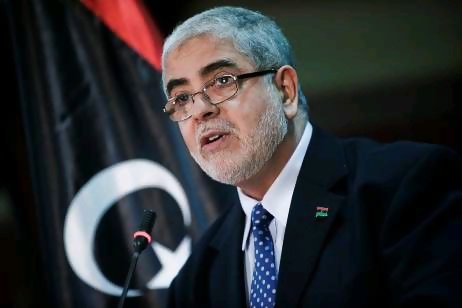






No comments:
Post a Comment